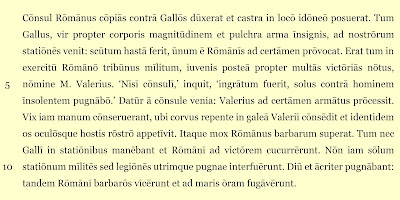Cōnsul Rōmānus cōpiās contrā Gallōs dūxerat et castra in locō idōneō posuerat. Tum Gallus, vir propter corporis magnitūdinem et pulchra arma īnsignis, ad nostrōrum statiōnēs vēnit: scūtum hastā ferit, ūnum ē Rōmānīs ad certāmen prōvocat. Erat tum in exercitū Rōmānō tribūnus mīlitum, iuvenis posteā propter multās victōriās nōtus, nōmine M. Valerius. ‘Nīsī cōnsulī,’ inquit, ‘ ingrātum fuerit, solus contrā hominem īnsolentem pugnābō.’ Datūr ā cōnsule venia: Valerius ad certāmen armātus prōcessit. Vix iam manum cōnseruerant, ubi corvus repente in galeā Valeriī cōnsēdit et identidem os oculōsque hostis rōstrō appetīvit. Itaque mox Rōmānus barbarum superat. Tum nec Gallī in statiōnibus manēbant et Rōmānī ad victōrem cucurrērunt. Nōn iam sōlum statiōnum mīlitēs sed legiōnēs utrimque pugnae interfuērunt. Diū et ācriter pugnābant: tandem Rōmānī barbarōs vīcērunt et ad maris ōram fugāvērunt.
1]
Lines 1 – 3 (Cōnsul … provocat)
[i]
Who were the Romans fighting? (1)
[ii]
Where had the consul located the camp? (1)
[iii]
How did one of the enemy intimidate the Romans? (2)
[iv]
(line 3) venit … ferit … prōvocat: what tense is used here and why? (2)
[2]
Lines 3 – 6; translate (12)*
[i]
Erat tum [ii] in exercitū Rōmānō [iii] tribūnus mīlitum, ¦ [iv] iuvenis posteā ¦
[v] propter multās victōriās ¦ [iv] nōtus, ¦ [vi] nōmine M. Valerius. ¦ [vii] ‘Nīsī
cōnsulī,’ inquit, ‘ingrātum fuerit, ¦ [viii] solus [ix] contrā hominem
īnsolentem [viii] pugnābō.’ [x] Datūr ā cōnsule venia: ¦ [xi] Valerius [xii] ad
certāmen [xi] armātus prōcessit.
Note:
fuerit; what tense is this? How would it literally translate? How would
it best translate into fluent English?
[3]
Lines 7 – 8 (Vix … superat)
[i]
Briefly explain how Valerius won the fight. (4)
[ii]
Which single words in this extract indicate that …
[a]
the fight had just started (1)
[b]
the first action was sudden (1)
[c]
it was a sustained attack (1)
[d]
the barbarian was quickly beaten (1)
[4]
Lines 8 – end (Tum … fugāvērunt)
[i]
How did [a] the Gauls and [b] the Romans react after the attack? (2)
[ii]
How did the battle intensify? (4)
[iii]
What was the outcome of the battle? (2)
[5]
vir
propter [i] corporis [ii] magnitūdinem … īnsignis │ a man remarkable on account
of [ii] __________ [i] __________
ad
[i] nostrōrum [ii] statiōnēs vēnit │ he came to [ii] __________ [i] __________
Nōn
iam sōlum [i] statiōnum [ii] mīlitēs … pugnae interfuērunt. │ No longer were
only the [ii] __________ [i] __________ involved in the battle …
Rōmānī
barbarōs … ad [i] maris [ii] ōram fugāvērunt │ The Romans put the barbarians to
flight towards [ii] __________ [i] __________
https://en.wikipedia.org/wiki/Marcus_Valerius_Corvus
____________________
*[2] [i] At that
time there was ¦ [ii] in the Roman army ¦ [iii] a military tribune, [iv] a
young man later / afterwards well-known [v] on account of (his) many victories
¦ [vi] by the name of Valerius. ¦ [vii]
“Unless it displeases the consul,” / “If it does not displease the consul,” he
said ¦ [viii] “I shall fight alone ¦ [ix] against the arrogant / haughty /
insolent man.” ¦ [x] Permission was given [historical present in the original
Latin] by the consul: ¦ [xi] Valerius, armed, advanced [xii] towards the contest
/ fight.



No comments:
Post a Comment